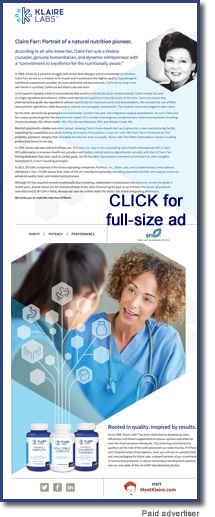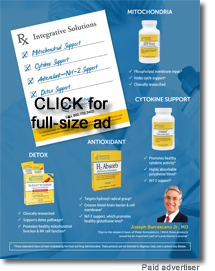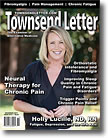|
It's time to stop calling hypothalamic-pituitary-adrenal (HPA) axis dysregulation and its myriad of clinical conditions, including emotional and physical overload, "adrenal fatigue." The adrenal glands don't get "fatigued" or "burned out" – the condition simply doesn't exist. It's understandable that patients may identify with the term, but what we're seeing as practitioners are people feeling overwhelmed due to a multitude of reasons, some perhaps due to early conditioning and adverse childhood experiences.
 And for that reason, we need to be consistent with the literature in our vocabulary and thoroughly examine the reasons why patients feel overwhelmed and unable to cope effectively with changing conditions and daily stressors, and most importantly how we can help them turn around these maladaptive responses. Research indicates that for many people, these responses have causes that originate very early in life. So, while patients don't have adrenal fatigue, they might have a high adverse childhood events (ACE) score. And for that reason, we need to be consistent with the literature in our vocabulary and thoroughly examine the reasons why patients feel overwhelmed and unable to cope effectively with changing conditions and daily stressors, and most importantly how we can help them turn around these maladaptive responses. Research indicates that for many people, these responses have causes that originate very early in life. So, while patients don't have adrenal fatigue, they might have a high adverse childhood events (ACE) score.
Adverse Childhood Events and Later Life Conditions
While it seems almost intuitive that stressors in childhood could cause later risks for health, one of the studies that codified the idea and brought it to general attention was published in 1998 in the American Journal of Preventive Medicine.1
This article introduced the Adverse Childhood Events (ACE) study. This questionnaire examined the responses to seven types of adverse early life experiences and their effects on health later in life. This study and follow-up similar studies found that individuals who score higher on these surveys tend to have corresponding health issues that can include depression, addiction, smoking, and attempted suicide. While there are many factors in the development of these concerns, many of them trace back to patterns established in biochemistry and the compromised response of the hypothalamic-pituitary-adrenal (HPA) axis years before.
Dr. Robert Anda, one of the researchers on the 1998 study and a developer of the ACE questionnaire, has noted the interaction between the development of the HPA axis and stress, and that impaired memories of childhood also increase in conjunction with higher ACE scores. Additionally, he reported a relationship between those scores and panic and anxiety among respondents.
Because the hippocampus is a critical player in the way individuals store and recall memories, the burden of stress – and being inhibited in an ability to deal with stressors – can make its job even harder. For those who have experienced abuse or trauma in early life, this translates into a reduced ability to cope with changes and stressors as an adult.2
More recently, a survey in Wisconsin found that higher ACE scores corresponded with self-reported frequent mental stress, anxiety, and overall poor general and physical health.3
Another, even more recent article in Frontiers in Cellular Neuroscience reviews the evidence on how fetal exposure to corticosteroids in the perinatal period, as the mother experiences stress, can have a lasting effect. Even natural buffering by the 11β-hydroxysteroid dehydrogenase type 2 enzyme (11β-HSD2) can't completely protect a developing HPA axis from the effects of this heightened hormone activity, setting up the potential for major depressive disorder, anxiety, and a heightened awareness of stressors. Other work has shown that the weight of negative experiences early in life essentially "programs" the way that a person responds to challenges. By affecting the HPA axis and regions of the brain associated with memory, fear response, and conflict strategies, adverse childhood events create challenging conditions for practitioners to address in a concrete, meaningful way. 4-9 However, supplemental interventions can make a notable difference.
 Townsend Letter provides a platform for those examining and reporting on functional and integrative medicine. Please support these independent voices. Townsend Letter provides a platform for those examining and reporting on functional and integrative medicine. Please support these independent voices. |
Supplementing a Patient's Lifestyle
Properly guided supplemental measures can be one of the pillars for helping a patient change maladaptive patterns of behavior and adapt more easily to daily challenges, especially if they are aware of their history and current condition.
Adaptogens Help Patients Adapt to Psychological and Physical Stressors
Suitably incorporated into a patient's lifestyle, adaptogens can improve reactions to stress. Two adaptogens that I've seen have positive effects are ashwagandha and rhodiola. Both can help patients overcome feelings of mental and physical fatigue, making them an ideal adjunct to stress-reducing exercise.
In a 60-day test, volunteers were separated into ashwagandha (300 mg, 2x daily) and placebo groups.10 Each individual completed surveys relating to anxiety, stress, depression, and fatigue, including the Perceived Stress Scale (PSS), the Depression Anxiety Stress Scale (DASS) questionnaire and the 28-item version of the General Health Questionnaire (GHQ-28).
By the end of the study, participants in the ashwagandha group noted a 44 percent reduction in PSS scores, while the placebo group saw only a 5.5 percent reduction.
In the GHQ-28 questionnaire assessment, the ashwagandha group showed clear reductions in many stress-related symptoms, including the following:
- Somatic symptoms by 76.1 percent,
- Anxiety and insomnia by 69.7 percent,
- Social dysfunction by 68.1 percent, and
- Severe depression by 79.2 percent.
By contrast, the placebo group change was much smaller: 4.9%, 11.6%, -3.7% and -10.6%, respectively. The range of difference between treatment and placebo for the GHQ-28 was 58 to 89 percentage points, a clear indicator of efficacy.
Results of the DASS questionnaire were similar. After 60 days, the ashwagandha group saw powerful reductions, including the following:
- Depression by 77 percent,
- Anxiety by 75.6 percent, and
- Stress by 64.2 percent.
Here again, the placebo group saw a much different outcome: 5.2%, –4.3% and 10.4%, respectively, which included a rise in the anxiety score.
Serum cortisol levels were also recorded; and after 60 days, the ashwagandha group saw a 27.9 percent reduction in baseline versus 7.9 in the placebo group.10
Other work with ashwagandha has found that it also increases maximal aerobic capacity (VO2 max) in endurance cyclists. In this study, ashwagandha (500 mg, 2x daily) or placebo was provided for eight weeks. By the study's end, athletes in the ashwagandha group showed a 13 percent increase in VO2 max versus no improvement for the placebo group. While not all patients facing stress require the same interventions as elite cyclists, everyone – especially those dealing with stress – need to boost physical activity in order to help the mind function more appropriately to changing circumstances.11
Clinical research with rhodiola (Rhodiola rosea) shows positive results for dealing with psychological and physical stress as well. Natural compounds in rhodiola include rosavin, rosin, and rosarin, which work through the HPA-axis and are considered prime movers behind its effects.12
Clinical studies have shown improvements in concentration and mental performance for physicians on night duty, and neuro-motor tests and mental fatigue in college students.13,14
In a parallel, double-blind, placebo-controlled clinical study, patients in the rhodiola group received a total of 576 mg of a rhodiola extract four times daily. By the end of the 28-day study, the patients in the rhodiola group saw a decrease in cortisol levels in response to stress and improved concentration.15
Like ashwagandha, rhodiola appears to improve physical endurance and the state of mind of athletes, helping them feel greater alertness and a sense of calm during endurance exercise.16,17
Rhodiola may alleviate symptoms of depression, a condition that often presents with anxiety and stress. The Nordic Journal of Psychiatry reported a placebo-controlled clinical trial using two dosage levels of rhodiola (340 mg/daily and 680 mg/daily) found that both lower and higher dosages relieved insomnia, emotional instability, somatic symptoms, and overall depression after six weeks.18
Curcumin, Neurogenesis, and Cognitive Rewiring
The amygdala, cerebral cortex, and hypothalamus typically have the highest levels of brain-derived neurotrophic factor (BDNF), mitochondrial RNA, and protein concentrations in adults. However, stress lowers those levels, affecting neural plasticity, stress tolerance, and reactivity. But curcumin from turmeric (Curcuma longa) promotes neurogenesis and can raise levels of this key neurotrophin.19,20
Aside from curcumin (and possibly, prescription antidepressants), the ways that the body naturally produces BDNF is through exercise and the expression of a muscle protein, FNDC5. But exercise of any kind is unlikely to be top on the priority list of an individual who feels trapped by stress.21,22
But because curcumin can protect BDNF levels and reduce symptoms of depression, it may help individuals overcome the fatigue, anxiety, pain, and overwhelming emotions so commonly experienced due to an allostatic load that feels unworkable.23,24
 And ultimately, rebuilding BDNF levels can recreate brain plasticity to help patients form new response patterns. Achieving this with a natural medicine such as curcumin would clearly be the preferred choice for integrative practitioners and their patients.25-27 And ultimately, rebuilding BDNF levels can recreate brain plasticity to help patients form new response patterns. Achieving this with a natural medicine such as curcumin would clearly be the preferred choice for integrative practitioners and their patients.25-27
HPA-Axis-Specific Nutrients
While the adrenal glands are far from the only affected system in patients with a history of high stress responses or maladaptive reactions, the HPA axis still requires nutrients. To that end, there are supplemental ingredients I recommend to patients in combination that target HPA health. For example, pregnenolone is an allopregnanolone precursor, and the impairment of this important neurochemical could lead to feelings of anxiety and isolation, in addition to reduction of BDNF levels. For this reason, and its effect on dehydroepiandrosterone (DHEA) levels, pregnenolone is part of the combination of HPA-supporting nutrients I recommend to my patients.28,29
In fact, DHEA is also a useful nutrient for assisting HPA-axis function and patient resilience. DHEA levels typically decline with age, so if a patient is already struggling with stress, additional DHEA may make a difference. In one clinical trial, low-dosage DHEA appeared to improve alertness, stamina, and initiative, (as reported by spouses). A treatment plan emphasizing a traditional diet that excludes grains and promotes healthy proteins, fats, fruits, and vegetables may also be effective.30-33
Although clinical research is still ongoing and emerging, many nutrients traditionally recommended by practitioners for HPA-axis support have yielded positive results. Aside from DHEA, pregnenolone, and licorice extract, the combination I recommend also includes vitamin C (highly concentrated in adrenal tissues), vitamin B6 (in pyridoxal-5-phosphate form to bypass the need for liver conversion), pantothenic acid, rehmannia root extract, and bovine adrenal extract. Most likely, the effects of these varied ingredients are due to their support for a number of related systems beyond the HPA axis, including thyroid, musculoskeletal, and cognitive functions.34
Treating the Whole Condition, Not Just the Adrenals
I think that the results of the ACE surveys and other studies show that, overall, a patient's habitual responses to stress and the sense of exhaustion they engender are much more complicated than a case of "tired and burnt out adrenal glands." As responsible practitioners, we have a duty to point our patients to a more complete and more realistic and accurate diagnosis and treatment plan, and to understand that many of the causes of the reasons they come to us are deeply ingrained. With this in mind, we can compassionately educate and help patients work past a sense of feeling overwhelmed and unskillful coping styles, so they can live to their best potential.
References .pdf
 Holly Lucille, ND, RN, is a nationally recognized naturopathic doctor, educator and television and radio host. She is the author of Creating and Maintaining Balance: A Women's Guide to Safe, Natural, Hormone Health and serves on the American Association of Naturopathic Physicians Board of Directors. An acclaimed expert in the field of naturopathic medicine, Dr. Holly was listed in Time Magazine's "Alt List"as one of the "Top 100 Most Influential People." Her new television series, Myth Defying with Dr. Holly broadcasts on Veria Living TV. For more information, visit www.drhollylucille.com . Holly Lucille, ND, RN, is a nationally recognized naturopathic doctor, educator and television and radio host. She is the author of Creating and Maintaining Balance: A Women's Guide to Safe, Natural, Hormone Health and serves on the American Association of Naturopathic Physicians Board of Directors. An acclaimed expert in the field of naturopathic medicine, Dr. Holly was listed in Time Magazine's "Alt List"as one of the "Top 100 Most Influential People." Her new television series, Myth Defying with Dr. Holly broadcasts on Veria Living TV. For more information, visit www.drhollylucille.com .
|
![]()
![]()









